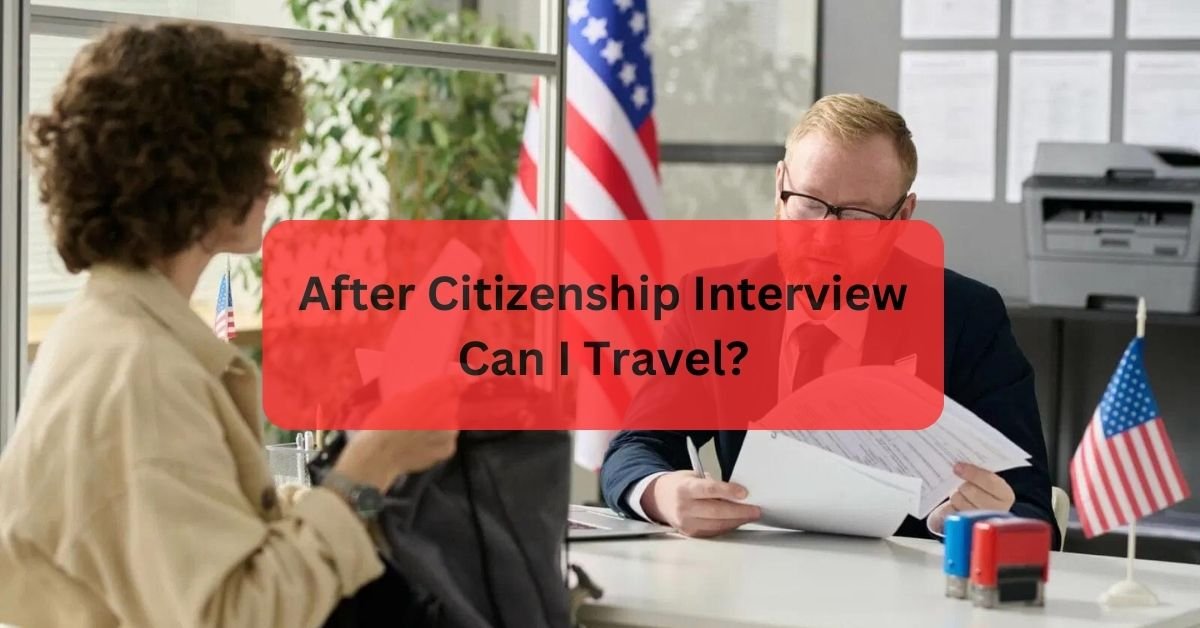After your citizenship interview, you’re probably feeling a mix of excitement and uncertainty. You’re on the brink of becoming a citizen of your new country, but you might be wondering about travel restrictions.
Yes, you can travel after your citizenship interview, but there are important considerations to keep in mind regarding your application status and the potential impact on your naturalization process.
After your citizenship interview, unlock the door to your new life and confidently travel; here’s everything you need to know!
Understanding The Citizenship Interview Process – Check It!
Understanding the citizenship interview process is crucial for naturalization applicants. The naturalization process involves several steps, beginning with the submission of Form N-400 and including background checks, biometrics, and, finally, the citizenship interview.
During the interview, a USCIS officer reviews the applicant’s information, tests their English proficiency, and assesses their U.S. history and government knowledge.
This interview is vital as it determines the applicant’s eligibility for citizenship. Successfully passing the interview leads to scheduling the Oath of Allegiance ceremony, marking the final step in becoming a U.S. citizen.
Post-Interview Travel – What You Need To Know!

Immediate Travel Considerations:
- Waiting for the Decision: Once the interview is complete, you must wait for the USCIS to decide on your application. This waiting period can impact your travel plans, as you must be available to receive any notifications or requests for additional information from USCIS.
- Impact on Travel Plans: Traveling while waiting for the decision can be risky. If USCIS requires further documentation or schedules your oath ceremony, you must be able to respond promptly. Being away from home could delay your ability to complete these final steps, potentially affecting the outcome of your application.
USCIS Policies on Travel After the Interview:
- Travel During Pending Applications: You can generally travel if your application is still pending. However, it’s crucial to ensure that your travel plans do not interfere with any USCIS communications or scheduled appointments. Keeping USCIS informed of your travel plans can help mitigate potential issues.
- Travel Restrictions and Guidelines: While there are no explicit travel restrictions after the interview, applicants should follow USCIS guidelines closely. Ensure you have all necessary documents, including proof of permanent residency, and be prepared to return promptly if required. Staying informed about the status of your application and any correspondence from USCIS is essential during this period.
Scenarios Affecting Travel Plans – You Should Know!

Receiving the Oath Ceremony Notice:
After approval, you will receive a notice from USCIS with your oath ceremony’s date, time, and location. This notice is crucial as it marks your final step in becoming a U.S. citizen.
Traveling Before the Oath Ceremony:
It is possible to travel before your oath ceremony, but you must ensure that your travel plans allow you to return in time for the scheduled ceremony.
Missing the oath ceremony can delay your citizenship process and may require rescheduling, which can take additional time.
Understanding the Denial:
USCIS will provide a detailed explanation for the denial of your application. This explanation will include the specific reasons why your application was not approved, which can help you address any issues if you decide to reapply.
Reapplying and Travel Implications:
If you choose to reapply for citizenship, be aware that the process will start over, including any necessary interviews and tests.
Travel plans should be made considering the new timeline and potential USCIS appointments, ensuring you can meet all requirements without delay.
Complying with RFE Requirements:

Responding promptly and accurately to an RFE is essential. This involves gathering the requested documents and submitting them within the given timeframe to avoid delays or complications in your application process.
Traveling While Responding to an RFE:
Travel during this period is possible but should be managed carefully. Ensure you can access and respond to any USCIS communications while traveling.
Being away for extended periods might complicate timely responses, so plan your travel accordingly to ensure your application is successful.
Read: Chicago area travel baseball – Unlock Your Child’s Potential
Practical Tips for Traveling After Your Citizenship Interview!
| Tips | Description |
| Keep Your Documents Handy | Carry essential documents like a passport, green card, and ID. Ensure you have proof of permanent residency. |
| Communicate with USCIS | Update USCIS on travel plans during pending applications. Contact USCIS for travel-related inquiries. |
| Plan for the Oath Ceremony | Schedule travel around the oath ceremony date. Make arrangements for transportation and accommodation. |
| Stay Informed and Prepared | Stay updated on USCIS guidelines and updates. Use reliable resources such as USCIS websites or immigration attorneys for information and advice. |
Common Questions About Post-Interview Travel – Remember It!
Can I Travel Internationally After My Citizenship Interview?
Many people wonder if they can travel to other countries after their citizenship interview. Generally, you can, but you need to be careful. If your application is still being processed, make sure your travel plans will be OK with USCIS.
If your application is approved, you can travel before your oath ceremony, but you must come back in time for it. Always carry your essential documents and let USCIS know about your travel plans.
How Long Can I Stay Abroad After the Interview?
If your application is still being processed, there’s no specific limit on how long you can stay abroad. But remember, you need to be available for any USCIS communications or appointments.
If your application is approved, you can technically remain abroad until your oath ceremony. But it’s crucial to plan your travel so you can make it back in time for the ceremony and avoid delays.
What Happens if I Miss My Oath Ceremony Due to Travel?
Missing your oath ceremony because of travel can cause problems. USCIS may reschedule it, which could delay becoming a citizen. It’s essential to prioritize attending the ceremony and plan your trip carefully.
If you have to miss it because of an emergency, let USCIS know as soon as possible and give them proof. Keeping in touch with USCIS is crucial in sorting out any issues arising from missing the ceremony.
Legal And Practical Advice – Remember To Do It!

When to Seek Legal Advice:
- If you encounter complex legal issues during the citizenship process.
- When you receive a Request for Evidence (RFE) or a denial letter.
- If you have concerns about your eligibility or need clarification on immigration laws.
How an Attorney Can Help:
- Provide personalized guidance based on your specific situation.
- Assist in preparing and submitting your application accurately and timely.
- Represent you in legal proceedings or hearings, if necessary.
Monitoring USCIS Updates:
- Regularly check the USCIS website for news, policy changes, and updates related to citizenship applications.
- Sign up for email alerts or subscribe to USCIS social media channels for real-time notifications.
Using Trusted Resources for Information:
- Refer to official government websites, such as USCIS and the Department of Homeland Security, for accurate and up-to-date information.
- Seek guidance from reputable immigration organizations or legal clinics that specialize in citizenship matters.
Read: Can Felons Travel To Ireland? – What You Need to Know!
Frequently Asked Questions:
1. Can I travel internationally after my citizenship interview?
Yes, you can generally travel internationally after your interview, but it’s important to consider the status of your application and any pending USCIS communications or appointments.
2. How long can I stay abroad after the interview?
If your application is still pending, there’s no strict limit on how long you can stay abroad, but ensure you’re available for USCIS communications. If your application is approved, you can stay abroad until your oath ceremony, but plan to return in time for it.
3. What happens if I miss my oath ceremony due to travel?
Missing the oath ceremony can cause delays in your citizenship process. USCIS may reschedule it, but it’s crucial to prioritize attending. If you must miss it due to an emergency, inform USCIS promptly and provide documentation.
4. When should I seek legal advice during the citizenship process?
Seek legal advice if you encounter complex legal issues, receive a Request for Evidence (RFE) or a denial, or have concerns about eligibility or immigration laws.
5. How can an immigration attorney help me?
An immigration attorney can provide personalized guidance, assist with application preparation, and represent you in legal proceedings if necessary.
6. How can I stay informed about USCIS updates?
Monitor the USCIS website, sign up for email alerts or subscribe to USCIS social media channels for updates related to citizenship applications.
7. Where can I find trusted resources for information on citizenship?
Refer to official government websites like USCIS and the Department of Homeland Security, or consult reputable immigration organizations and legal clinics specializing in citizenship matters.
8. What documents should I keep handy while traveling post-interview?
Carry essential documents such as your passport, green card, and proof of permanent residency.
9. Should I inform USCIS about my travel plans during the application process?
Yes, it’s advisable to inform USCIS about your travel plans to avoid any conflicts or delays.
10. How should I plan for the oath ceremony?
Schedule your travel around the oath ceremony date, make necessary arrangements in advance, and ensure you’re prepared to attend without any complications.
Conclusion:
It’s natural to have questions about traveling after your citizenship interview. Understanding the citizenship interview process and the implications of traveling post-interview is crucial.
While you may be eager to travel, consider the impact on your application and citizenship status. You can navigate the post-interview period confidently and responsibly by staying informed, communicating with USCIS, and seeking legal advice when needed.
Read:




